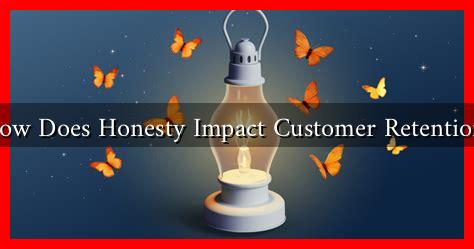-
Table of Contents
How Does Honesty Impact Customer Retention?
In today’s competitive marketplace, businesses are constantly seeking ways to enhance customer retention. One of the most powerful yet often overlooked factors in this equation is honesty. Honesty not only builds trust but also fosters long-term relationships with customers. This article explores how honesty impacts customer retention, supported by examples, case studies, and relevant statistics.
The Importance of Honesty in Business
Honesty in business refers to transparency, integrity, and ethical behavior in all dealings with customers. It encompasses everything from truthful advertising to open communication about product quality and pricing. The significance of honesty can be summarized in the following points:
- Builds Trust: Trust is the foundation of any relationship, including those between businesses and customers. When customers perceive a brand as honest, they are more likely to trust it.
- Enhances Reputation: A reputation for honesty can differentiate a business from its competitors, leading to increased customer loyalty.
- Encourages Repeat Business: Customers who feel they can trust a brand are more likely to return for future purchases.
Statistics That Speak Volumes
Research supports the notion that honesty significantly influences customer retention. According to a study by Harris Interactive, 86% of consumers say that honesty is a key factor in their purchasing decisions. Furthermore, a survey conducted by Zenith Media found that brands perceived as honest have a 20% higher customer retention rate compared to those that are not.
Case Studies: Honesty in Action
Several companies have successfully leveraged honesty to enhance customer retention. Here are a few notable examples:
- Patagonia: This outdoor clothing brand is known for its commitment to environmental sustainability and transparency. Patagonia openly shares its supply chain practices and the environmental impact of its products. This honesty has cultivated a loyal customer base that values ethical consumption.
- Zappos: The online shoe retailer is famous for its customer service and transparent return policy. Zappos encourages customers to return products they are not satisfied with, no questions asked. This level of honesty fosters trust and encourages repeat purchases.
- Buffer: A social media management platform, Buffer is transparent about its pricing and business practices. The company openly shares its revenue and employee salaries, which has built a strong community of loyal users who appreciate its honesty.
The Role of Communication
Effective communication is crucial in maintaining honesty with customers. Here are some strategies businesses can adopt:
- Clear Messaging: Ensure that all marketing materials accurately represent the product or service. Avoid exaggerations or misleading claims.
- Open Feedback Channels: Encourage customers to provide feedback and address their concerns promptly. This shows that the business values their opinions and is committed to improvement.
- Transparency in Pricing: Clearly outline all costs associated with a purchase, including hidden fees. This helps customers make informed decisions and reduces the likelihood of dissatisfaction.
Challenges to Maintaining Honesty
While honesty is essential, it can be challenging to maintain in a competitive environment. Some common challenges include:
- Pressure to Compete: Businesses may feel compelled to exaggerate their offerings to stand out in a crowded market.
- Fear of Negative Feedback: Companies may hesitate to admit mistakes or shortcomings, fearing it will drive customers away.
- Short-Term Gains vs. Long-Term Relationships: Some businesses prioritize immediate sales over building lasting relationships, leading to dishonest practices.
Conclusion: The Long-Term Benefits of Honesty
In conclusion, honesty plays a pivotal role in customer retention. By building trust, enhancing reputation, and encouraging repeat business, honest practices can lead to long-term success. Companies like Patagonia, Zappos, and Buffer exemplify how transparency and integrity can create loyal customer bases. While challenges exist, the long-term benefits of maintaining honesty far outweigh the short-term gains of deceitful practices. In an era where consumers are increasingly valuing ethical behavior, businesses that prioritize honesty will not only retain customers but also thrive in the marketplace.

